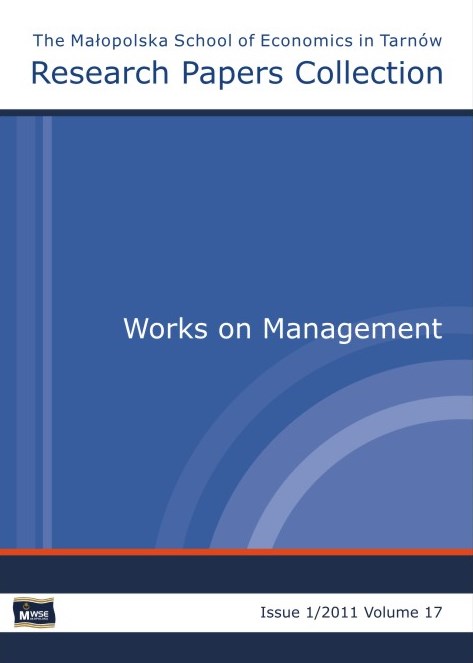Abstract
This paper presents the role of territorial marketing in development of rural communes in the context of competitiveness of the region. Under the present conditions, increasing significance is gained by the conditionings of the development of particular regions, which should constitute the basis of the directions of development of given provinces. For this reason, this study presents the idea of factors and elements of territorial marketing of a region present in the literature on the subject in the context of competitiveness of the region. For several years territorial marketing, whose subject can be a commune, a district, a region, a state and also a special spatial unit with exceptional social and political, tourist and historic meaning, in particular landscape and national parks as well as nature reserves and protected landscape regions, has started to play a significant role in development. The efficiency of affecting partners can be noticed not only in companies on the market of consumption goods, but also in service companies, investment sector, farms, social institutions, social organisations and non-profit institutions. This fact has stirred interest in territorial marketing. What has a significant meaning in the development of the analysed marketing is the specificity of a given state (region). Strong regionalisation and increase in competitiveness between centres is a meaningful stimulus for local marketing development, particularly in the face of economic backwardness of some regions, increase in the unemployment in those areas, the lack of services, etc. Furthermore, there is a demand for social support of local authorities as well as strong identification of inhabitants with a region (area). Strong identification is especially noticeable in the case of states and regions which up till the present day had strongly marked their local specificity, especially in terms of culture. In numerous countries or territories in the case of inhabitants’ satisfaction, there is also a high degree of presenting outside support for local authorities in a number of undertaken enterprises.
References
Adamowicz M., Skala lokalna w terytorialnym podziale kraju, W: M. Adamowicz (red.), Strategie rozwoju lokalnego, t. 1: Aspekty instytucjonalne, Szkoła Główna Gospodarstwa Wiejskiego, Warszawa 2003.
View in Google Scholar
Ashworth G.J., Is Places Marketing Really Marketing?, Regional Studies Association Session, Place Marketing, Bilbao 1999.
View in Google Scholar
Bouinot J., La ville compétitive. Les clefs de la nouvelle gestion urbaine, Economica, Paris 2002.
View in Google Scholar
Dziewoński K., Mała encyklopedia ekonomiczna, PWN, Warszawa 1974.
View in Google Scholar
Fayolle A., Entrepreneuriat: Apprendre à entreprendre, Dunod, Paris 2004.
View in Google Scholar
Gouttebel J.-Y., Stratégies de développement territorial, Economica, Paris 2003.
View in Google Scholar
Iwankiewicz-Rak A., Marketing organizacji niedochodowych – wybrane problemy adaptacji w warunkach polskich, Wydawnictwo Akademii Ekonomicznej, Wrocław 1997. ISBN 83-7011-267-6.
View in Google Scholar
Klasik A., Kuźnik F., Konkurencyjny rozwój regionów w Europie, W: Z. Szymla (red.), Konkurencyjność miast i regionów, Wydawnictwo Akademii Ekonomicznej, Kraków 2001. ISBN 83-7252-098-4.
View in Google Scholar
Konkurencyjność polskiej gospodarki, Rządowe Centrum Studiów Strategicznych, Warszawa 2002.
View in Google Scholar
Kuciński K., Podstawy teorii regionu ekonomicznego, PWN, Warszawa 1990. ISBN 83-01-095857.
View in Google Scholar
Kudełko J., Rozwój regionalny a konkurencyjność regionów, W: Z. Zioło (red.), Uwarunkowania rozwoju i konkurencyjności regionów, Wydawnictwo Wyższej Szkoły Informatyki i Zarządzania w Rzeszowie, Kraków–Rzeszów 2005. ISBN 83-87658-69-3.
View in Google Scholar
Leśniak J., Rola instrumentów marketingu ekologicznego we wdrażaniu rozwoju zrównoważonego na przykładzie Szwecji, W: F. Piontka (red.), Ekonomia a rozwój zrównoważony, Wydawnictwo Ekonomia i Środowisko, Białystok 2001.
View in Google Scholar
Markowski T., Wspieranie wzrostu konkurencyjności w polityce rozwoju regionalnego, W: R. Broszkiewicz i in. (red.), Strategiczne wyzwania dla polityki rozwoju regionalnego Polski, Friedrich Ebert Stiftung, Warszawa 1996. ISBN 83-903900-5-1.
View in Google Scholar
Ochrona środowiska 2003, Zakład Wydawnictw Statystycznych, Warszawa 2003. ISSN 0867-3217.
View in Google Scholar
Pietrzyk I., Konkurencyjność regionów w ujęciu Komisji Europejskiej, W: M. Klamut, L. Cybulski (red.), Polityka regionalna i jej rola w podnoszeniu konkurencyjności regionów, Wydawnictwo Akademii Ekonomicznej, Wrocław 2000. ISBN 83-7011-483-0.
View in Google Scholar
Popławski Ł., Remarks on the role of territorial marketing in eco-development of rural communes of Świętokrzyskie Voivodeship (Poland), „Zeszyty Naukowe”, Uniwersytet Ekonomiczny w Bratysławie (w druku).
View in Google Scholar
Samuelson P.A., Nordhaus W.D., Ekonomia, t. 2, przeł. H. Hagemejer, K. Hagemejer, J. Czekaj, Wydawnictwo Naukowe PWN, Warszawa 2000. ISBN 83-01-11906-3.
View in Google Scholar
Sektorowy program operacyjny. Wzrost konkurencyjności gospodarki, lata 2004–2006, Ministerstwo Gospodarki, Warszawa 2002.
View in Google Scholar
Siekierski J., Rolnictwo i wieś polska wobec współczesnych wyzwań rozwojowych i integracyjnych, Wydawnictwo Małopolskiej Wyższej Szkoły Ekonomicznej, Tarnów 2002. ISBN 83-917312-0-0.
View in Google Scholar
Sokólska J., Produkt markowy jako czynnik rozwoju lokalnego – doświadczenia z realizacji projektu „Tereny, ludzie, produkty”, W: A. Bołtromiuk (red.), Gospodarowanie na obszarach chronionych, Wydawnictwo Uniwersytetu w Białymstoku, Białystok 2001. ISBN 978-83-87884-83-9.
View in Google Scholar
Szromnik A., Marketing terytorialny – koncepcja ogólna i doświadczenia praktyczne, W: T. Markowski (red.), Marketing terytorialny, Państwowa Akademia Nauk, Komitet Przestrzennego Zagospodarowania Kraju, Warszawa 2002. ISBN 83-915720-9-9.
View in Google Scholar
Szromnik A., Marketing terytorialny w strategiach rozwoju lokalnego, W: M. Adamowicz (red.), Strategie rozwoju lokalnego, Szkoła Główna Gospodarstwa Wiejskiego, Warszawa 2003. ISBN 83-7244-461-7.
View in Google Scholar
Szymczak M. (red.), Słownik języka polskiego, t. 1, PWN, Warszawa 1978.
View in Google Scholar
Wiatrak A.P., Przedsiębiorczość w strategii rozwoju gminy, V Kongres SERiA, Wydawnictwo Akademii Ekonomicznej, Wrocław 1998.
View in Google Scholar
Wiatrak A.P., Rozwój zrównoważony w strategii rozwoju gminy rolniczej, „Acta Agraria et Silvestria” 2003, vol. 40, Sesja Ekonomiczna.
View in Google Scholar
Zagórska E., Marketing gminny jako czynnik strategii rozwojowej samorządów terytorialnych, „Inżynieria Rolnicza” 2002, nr 8.
View in Google Scholar
© Copyright by Małopolska School of Economics in Tarnów. The articles are available under the Creative Commons Attribution NonCommercial-NoDerivatives 4.0 International License


